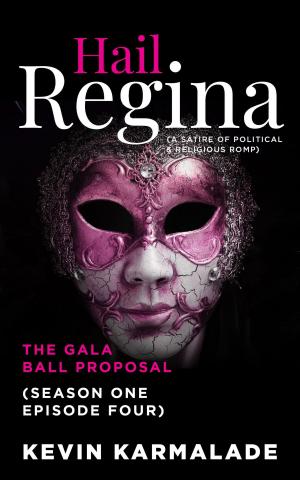Order Out of Chaos
SEASON ONE - EPISODE TWO
Fiction - YA, Dystopia, Kids, Teen, Dystopian, Fiction & Literature| Author: | Kevin Karmalade | ISBN: | 9781642376326 |
| Publisher: | Gatekeeper Press | Publication: | April 24, 2019 |
| Imprint: | Gatekeeper Press | Language: | English |
| Author: | Kevin Karmalade |
| ISBN: | 9781642376326 |
| Publisher: | Gatekeeper Press |
| Publication: | April 24, 2019 |
| Imprint: | Gatekeeper Press |
| Language: | English |
It is 2027. The episode opens with a snapshot of the State Command Control-Tower. It is monitoring the State-leader, Royston Bustwick. He is speeding through the Capital in a platinum-coloured vehicle, with helmeted guards - strapped onto outside standing-boards, as they guard him. He returns safely to the Vivatrium with his chief-minder, Commodore Petersen. They alight to attend a meeting upstairs in the chamber of the Dominus Regis. They formally convene the Table of Knowledge, a type of cabinet, for the purpose of governing the state. Bustwick offers his Exchequer, Jack Spooner some meeting bread dipped in a spicy sauce. Bustwick proposes a toast, “To order out of chaos,” (an old mason proclamation).
After some strange, but short rituals are completed, Royston Bustwick begins to preside over the agenda under a classical architectural feature – the painted dome of the Dominus Regis. He is depicted in a similar to the way Christ might have sat with his twelve apostles at the Last Supper. From here, on this day - he rules the state. A vote is taken to keep Governor Graves on life-support. This allows Bustwick to maintain dual roles and powers, as he fills in for Graves whilst his coma continues, as it has for the last 20 months. The Exchequer has objected. He believes it costs too much to keep a lame-duck governor in a permanent coma. We surmise that Spooner has alternative motives: he dislikes Bustwick enjoying this increase in power and position. What Spooner really wants is the State-leader's job.
When Jack Spooner is invited to take some meeting bread from a tray, it casts a shadow over the Exchequer as a potential ‘Judas’ figure. Commodore Petersen has informants everywhere throughout the Capital, who keep an eye on Spooner. The Exchequer as the anti-hero has begun to oppose the Docklands building project. As the meeting progresses, the oligarchs appear less worried than he, that the cost blow-outs can be contained by Sir Percy, Director-General Fagan and their officials within the Infrastructure and Tourism Bureau.
Dirk van Ritter – is discussed, especially his antics at Sir Percy’s gala-ball where he became the ping-pong champion at that charity event, held at St. Dandy’s - back in December 2025. The oligarch’s are raucous at hearing he might be a genuine ’foot-washer’. One who is attracted to washing the feet of others, possibly as a fetish, or possibly as an act of genuine service – we do not know. But if he is one, the oligarchs decide they want him to wash their feet, the next time they engage in that ritual.
Readers are introduced to the Attorney-General, Reginald Thudmore. He stands to propose a maverick plan to feed 5,000 citizen’s at some 12 sittings per day. After the great economic crash, millions have been turned out of the Capital into debt-internment camps. He is compelled to want to feed them more productively. He proposes to fund the compulsory acquisition of some ‘faster-food’ outlets. His slide show explains to the oligarchs how they are able to dispose of vehicles, and have the citizens lined up instead - in rows to get a meal. The proposal is met with enthusiasm and is finally passed by them.
About the Author
This is Kevin Karmalade's debut novella series. The 'Hail Regina' series will consist of 6 novella's (with 6-8 episodes per season). Karmalade sees Hail Regina as predominantly a vintage-style, theatrical satire. The work does not set out to mirror societal dysfunction or hypocrisy in the strong way - as some of the classic dystopian novels did in the past. Rather, Hail Regina should be understood primarily as a modern entertainment fiction set within the genre. It is written to entertain above all else.
Karmalade may be regarded as a mischievous, playful storyteller. A ‘jester’ of sorts, who reels us in with a simple story - then sometimes holds a mirror to our face. The writer is aware that on some level, the work naturally touches upon the obvious flaws of humanity. The theme of human liberation and freedom in literature is familiar to most. This serialized tale then, does not try to break new thematic ground. It does however present readers of all ages (from 14+) this classic theme, in an opaque, but contemporary and engaging way.
It is 2027. The episode opens with a snapshot of the State Command Control-Tower. It is monitoring the State-leader, Royston Bustwick. He is speeding through the Capital in a platinum-coloured vehicle, with helmeted guards - strapped onto outside standing-boards, as they guard him. He returns safely to the Vivatrium with his chief-minder, Commodore Petersen. They alight to attend a meeting upstairs in the chamber of the Dominus Regis. They formally convene the Table of Knowledge, a type of cabinet, for the purpose of governing the state. Bustwick offers his Exchequer, Jack Spooner some meeting bread dipped in a spicy sauce. Bustwick proposes a toast, “To order out of chaos,” (an old mason proclamation).
After some strange, but short rituals are completed, Royston Bustwick begins to preside over the agenda under a classical architectural feature – the painted dome of the Dominus Regis. He is depicted in a similar to the way Christ might have sat with his twelve apostles at the Last Supper. From here, on this day - he rules the state. A vote is taken to keep Governor Graves on life-support. This allows Bustwick to maintain dual roles and powers, as he fills in for Graves whilst his coma continues, as it has for the last 20 months. The Exchequer has objected. He believes it costs too much to keep a lame-duck governor in a permanent coma. We surmise that Spooner has alternative motives: he dislikes Bustwick enjoying this increase in power and position. What Spooner really wants is the State-leader's job.
When Jack Spooner is invited to take some meeting bread from a tray, it casts a shadow over the Exchequer as a potential ‘Judas’ figure. Commodore Petersen has informants everywhere throughout the Capital, who keep an eye on Spooner. The Exchequer as the anti-hero has begun to oppose the Docklands building project. As the meeting progresses, the oligarchs appear less worried than he, that the cost blow-outs can be contained by Sir Percy, Director-General Fagan and their officials within the Infrastructure and Tourism Bureau.
Dirk van Ritter – is discussed, especially his antics at Sir Percy’s gala-ball where he became the ping-pong champion at that charity event, held at St. Dandy’s - back in December 2025. The oligarch’s are raucous at hearing he might be a genuine ’foot-washer’. One who is attracted to washing the feet of others, possibly as a fetish, or possibly as an act of genuine service – we do not know. But if he is one, the oligarchs decide they want him to wash their feet, the next time they engage in that ritual.
Readers are introduced to the Attorney-General, Reginald Thudmore. He stands to propose a maverick plan to feed 5,000 citizen’s at some 12 sittings per day. After the great economic crash, millions have been turned out of the Capital into debt-internment camps. He is compelled to want to feed them more productively. He proposes to fund the compulsory acquisition of some ‘faster-food’ outlets. His slide show explains to the oligarchs how they are able to dispose of vehicles, and have the citizens lined up instead - in rows to get a meal. The proposal is met with enthusiasm and is finally passed by them.
About the Author
This is Kevin Karmalade's debut novella series. The 'Hail Regina' series will consist of 6 novella's (with 6-8 episodes per season). Karmalade sees Hail Regina as predominantly a vintage-style, theatrical satire. The work does not set out to mirror societal dysfunction or hypocrisy in the strong way - as some of the classic dystopian novels did in the past. Rather, Hail Regina should be understood primarily as a modern entertainment fiction set within the genre. It is written to entertain above all else.
Karmalade may be regarded as a mischievous, playful storyteller. A ‘jester’ of sorts, who reels us in with a simple story - then sometimes holds a mirror to our face. The writer is aware that on some level, the work naturally touches upon the obvious flaws of humanity. The theme of human liberation and freedom in literature is familiar to most. This serialized tale then, does not try to break new thematic ground. It does however present readers of all ages (from 14+) this classic theme, in an opaque, but contemporary and engaging way.















